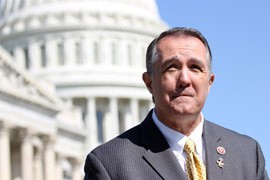Cronkite News has moved to a new home at cronkitenews.azpbs.org. Use this site to search archives from 2011 to May 2015. You can search the new site for current stories.
National pro-life leaders undaunted by failure of Arizona abortion law
WASHINGTON – National Right to Life leaders said Tuesday they are not concerned about the Supreme Court’s refusal to reinstate an Arizona law banning abortions after 20 weeks of pregnancy, expressing confidence that similar measures will pass in other states.
The officials, speaking on the eve of Wednesday’s annual March for Life in Washington, said their organization has a template for such legislation that is slightly different than the Arizona law and which they believe will stand up to court scrutiny. At least 10 other states have passed or are considering such measures, said Executive Director David O’Steen.
Arizona is not currently one of those states. No bills had been introduced in the legislature as of Tuesday to replace the 20-week ban that was rejected by a federal court last May.
But it is “likely legislation will be introduced in the next couple weeks requiring women to be informed of fetal development and gestational development,” before an abortion is performed, said Chris Leone, communications specialist for the Arizona House Republican Caucus.
The 9th U.S. Circuit Court of Appeals ruled in May that the 2012 Arizona law was unconstitutional because it denied a woman’s right to decide to have an abortion before her fetus was viable outside the womb. The Supreme Court last week declined, without comment, to hear a state appeal of that decision, letting the circuit court ruling stand.
The Arizona law “was unconstitutional because Roe v. Wade clearly protects abortion up to 24 weeks,” said Kat Sabine, executive director of NARAL Pro-Choice Arizona, referring to the 1973 Supreme Court ruling that recognized a woman’s right to abortion.
Sabine said she was not surprised by the failure of the state law and predicted that a similar bill on the national level would meet the same fate.
“It’s a waste of state resources, and if anything like it goes national it will only make more people wary,” Sabine said. “We should leave this to women and their doctors and they should just focus on job bills for the people still here.”
But the national pro-life leaders expressed optimism in Tuesday’s conference call about the chances for a U.S. House bill that would ban abortions after 20 weeks, the point at which supporters of the measure say a fetus can feel pain. The “Pain-Capable Unborn Child Protection Act” – sponsored by Rep. Trent Franks, R-Glendale, with 184 co-sponsors – passed the House last summer and has been pending in the Senate since.
John Jakubczyk, president of the Southwest Life and Law Center, said he is still optimistic about the chances for passage of a 20-week ban, despite the rejection of the Arizona law.
“Roe v. Wade was based on what they knew about fetuses at the time,” Jakubczyk said. “With new science proving that fetuses can feel pain at earlier times it’s still debatable where new limits can be added.”
O’Steen said that is not the only thing that has changed in the 41 years since Roe v. Wade. National Right to Life cited statistics that show the number of abortions nationally has fallen from a peak of about 1.6 million in 1990 to anywhere between 1.1 million and 1.2 million a year in recent years.
O’Steen also pointed to a Gallup poll that shows only 26 percent of Americans support what he calls “abortion on demand.”
That was countered by the Planned Parenthood Federation of America, which, in a prepared statement, pointed to a 2013 survey that said 70 percent of Americans do not want to see Roe v. Wade overturned.
But Randall K. O’Bannon, the National Right to Life director of education and research, accused Planned Parenthood as being more pre-occupied with performing abortions than other areas of women’s health.
“Planned Parenthood’s plans typically don’t involve parenthood,” O’Bannon said.







